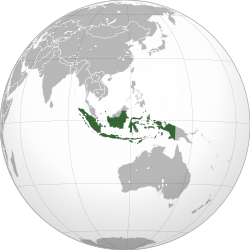Indonesia Institute of Islamic Dawah
Lembaga Dakwah Islam Indonesia | |
 Area served | |
| Abbreviation | LDII |
|---|---|
| Established | January 3, 1972 |
| Founder | Drs. Nur Hasyim, et.al. |
| Founded at | Kediri |
| Type | NGO |
| 02.414.788.6-036.000 | |
| Registration no. | AHU-18.AH.01.06.Tahun.2008 |
| Legal status | foundation |
| Purpose | humanitarian, socio-religious activism |
| Headquarters | Jalan Arteri Tentara Pelajar 28, Patal, Senayan, Jakarta Selatan 12210 |
| Location | |
| Coordinates | 6°13′10″S 106°47′31″E / 6.219356°S 106.792042°E |
Area served | Indonesia |
| Methods | Islamic proselytism |
| Membership | 30+ millions |
Official languages | Indonesian and English |
Head of the Advisory Council | Kasmudi Asshidqi, S.E., M.Ak. |
Chairman | Ir. Chriswanto Santoso, M.Sc. |
General Secretary | Dody Taufiq Wijaya, Ak., M.Com., CA. |
| Website | ldii |
Formerly called | Yayasan Karyawan Islam (YAKARI) Lembaga Karyawan Islam (LEMKARI) |
Indonesia Institute of Islamic Dawah (Indonesian: Lembaga Dakwah Islam Indonesia, LDII) is one of the Islamic community organizations in Indonesia that focuses on preaching and teaching Islam based on the Qur'an and Hadith. This organization is known to have rapid development, with an estimated number of non-members who participate in activities or are influenced by its preaching reaching more than 30 million people.[1] However, LDII also faced a number of controversies that accompanied its organizational journey.
History
[edit]LDII was founded on July 1, 1972 in Kediri City, East Java, with the initial name of the Islamic Employee Institution Foundation (YAKARI). The establishment of this organization was based on the Notarial Deed of Mudijomo dated July 27, 1972, which was a correction of the Deed dated January 3, 1972 regarding the determination of the date of establishment of LEMKARI.[2] This institution was founded by several figures, namely:
- Drs. Nur Hasyim;
- Drs. Edi Masyadi;
- Drs. Bahroni Hertanto;
- Soetojo Wirjo Atmodjo, BA;
- Wijono, BA.
In 1981, through the YAKARI Grand Conference, the name of the organization was changed to the Islamic Employee Institution (LEMKARI).[3] Furthermore, at the Fourth LEMKARI Grand Conference in 1990, the name of the organization was changed again to the Indonesia Institute of Islamic Dawah (LDII).[4][3] This change was made at the direction of the Vice President of the Republic of Indonesia at that time, Sudharmono, and Rudini. The name "LEMKARI" was changed because it was considered similar to the abbreviation of the Indonesian Karate-Do Institute.[2]
Legal Status and Motto
[edit]Legal Status
[edit]LDII is an independent and legal organization in accordance with the regulations below:
- Undang-undang Nomor 16 tahun 2017 tentang Organisasi Kemasyarakatan;
- Surat Keterangan terdaftar No. 98/D.III.3/VIII/2005 tanggal 23 Agustus 2005 dari Kesbangpol Kemendagri RI;
- Keputusan Menteri Hukum dan Hak Asasi Manusia RI No. AHU-18.AH.01.06.Tahun.2008 tertanggal 20 Februari 2008;
- Keputusan Komisi Fatwa Majelis Ulama Indonesia No. 03/Kep/KF-MUI/IX/2006 Tanggal 11 Syaban 1427 H / 4 September 2006 tentang Lembaga Dakwah Islam Indonesia (LDII);
- AD/ART LDII.[5]
Structure and Figures
[edit]Structure
[edit]LDII adopted an organizational level similar to Golongan Karya, this is inseparable from the closeness of the two in the past.[6] The details are as follows:
| Number | Name | Status | Position at Level | Number |
|---|---|---|---|---|
| 1 | DPP | Central Leadership Council | Capital | 1 |
| 2 | DPW | Regional Leadership Council | Province | 38 |
| 3 | DPD | Regional Leadership Council | Regency/City | 514 |
| 4 | PC | Branch Leader | District/Sub-district | 7,094 |
| 5 | PAC | Sub-Branch Leader | Village/Sub-district | 83,447 |
Famous people
[edit]LDII members who are well known to the public include:
- Benyamin Sueb, Indonesian actor, comedian, director and singer.[7]
- Ben Kasyafani, Indonesian actor and presenter.[8]
- Ida Royani, Indonesian model, actor, singer, fashion designer and politician.[9]
- Didi Petet, Indonesian actor and producer.[10]
- Keenan Nasution, Indonesian musician and singer.
- Suryo Agung Wibowo, Indonesian football player and runner.
- Dikri Yusron, Indonesian footballer
- Budi Sudarsono, Indonesian footballer and coach.
- Herry Kiswanto, Indonesian footballer and coach.[11]
- Ki Joko Bodo, former Indonesian actor.[12]
Catatan Kaki
[edit]See also
[edit]- Islam in Indonesia
- Indonesian Ulema Council
- Nahdlatul Ulama
- Muhammadiyah
- Indonesian Chinese Islamic Association
- Hizbut Tahrir Indonesia
References
[edit]- ^ "DKPP Terima Kunjungan LDII". DKPP RI - Dewan Kehormatan Penyelenggara Pemilu Republik Indonesia. 2023-06-16. Retrieved 2025-01-15.
- ^ a b author, Faizin (2016). "PERSPEKTIF PEMIKIRAN POLITIK ISLAM: Suatu Analisis Pendahuluan Pemikiran Politik Lembaga Dakwah Islam Indonesia". Al-Qishthu. 14 (1): 83–100. ISSN 1858-1099. Archived from the original on 2020-11-26. Retrieved 2020-04-09.
{{cite journal}}:|last=has generic name (help) - ^ a b "Sejarah". www.ldii.or.id (in Indonesian). Archived from the original on 2020-02-16. Retrieved 2020-02-22.
- ^ "Sejarah – Pondok Pesantren Walibarokah Kota Kediri". Retrieved 2020-02-22.
- ^ "AD / ART". www.ldii.or.id (in Indonesian). Archived from the original on 2020-02-16. Retrieved 2020-02-22.
- ^ "Struktur Organisasi". www.ldii.or.id (in Indonesian). Archived from the original on 2020-02-16. Retrieved 2020-02-22.
- ^ "LINES TALK: BENYAMIN SUEB: "PAS GW MABUK LU BIARIN, GILIRAN GW NGAJI LU TIMPUKIN !!"" (in Indonesian). 17 June 2022. Retrieved 2023-09-26.
- ^ "Ben Kasyafani Aktif di LDII". www.viva.co.id (in Indonesian). 2012-09-11. Retrieved 2023-09-26.
- ^ IDA ROYANI KETEMU JOKOWI BANGGA JADI WARGA LDII."GW LDII SO WHAT GITU LOH⁉️" #ldii #podcast #ldiitv (in Indonesian), 24 December 2022, retrieved 2023-09-26
- ^ Lines, Redaksi (2021-09-18). "Mengenang Didi Petet dalam Sejarah LDII Tabanan". Lines Indonesia (in Indonesian). Retrieved 2023-09-26.
- ^ LDII TV (2024-06-15), Kisah Perjalanan Herry Kiswanto Ex Pemain Timnas Indonesia, retrieved 2025-01-15
- ^ Okezone (2022-11-22). "Cerita Ki Joko Bodo Sebelum Meninggal Dunia, Sempat Jadi Pemandu Wisata Rohani : Okezone Economy". economy.okezone.com/ (in Indonesian). Retrieved 2023-09-26.
External links
[edit]- (in Indonesian) Situs web resmi Lembaga Dakwah Islam Indonesia
- (in Indonesian) LDII.TV
- (in Indonesian) Situs web resmi Sako SPN
- (in Indonesian) Situs web resmi Persinas ASAD
